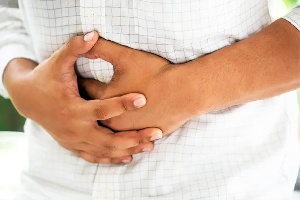- Home - News
- Elections 2024
- News Archive
- Crime & Punishment
- Politics
- Regional
- Editorial
- Health
- Ghanaians Abroad
- Tabloid
- Africa
- Religion
- Photo Archives
- Press Release
Health News of Monday, 24 March 2025
Source: www.ghanawebbers.com
Effective Ways To Reduce Bloating
**Why Are You Bloated?**
Bloating is that uncomfortable feeling in your belly after eating. It can happen if you eat too much or too quickly. Certain foods, especially those high in salt, fat, or sugar, can also cause it. Medical conditions like celiac disease and irritable bowel syndrome may increase bloating.
**Gassy Foods**
Beans are rich in fiber and protein. They contain raffinose, which bacteria break down and produce gas. This can lead to bloating but varies by person and type of bean. Broccoli, cabbage, and Brussels sprouts also have raffinose. Over-the-counter medications may help with digestion.
**Find the FODMAPs**
FODMAPs are hard-to-digest carbs that can cause bloating. They include lactose from dairy and fructose from fruits and honey. Keep a food diary to track how your body reacts to different foods. Share this information with your doctor to identify potential triggers.
**Slow Down!**
Eating quickly makes you swallow more air. This trapped air can swell your stomach and move into your intestines. Eating fast also leads to overeating since it takes time for your brain to signal fullness. Slowing down can help prevent bloating.
**Put Boundaries on Bubble**
Limit fizzy drinks like soda and beer. The gas from these beverages fills up your digestive system. Some gas is released as burps, while some passes through the digestive tract as flatulence.
**Be Carb-Smart**
Carbs digest faster than protein or fat, leading to quick energy use. Excess carbs are stored as glycogen or fat, both of which can cause bloating. Choose complex carbs like whole grains over simple ones like white bread.
**Eat Just Enough**
Your stomach is about the size of a fist. Overeating stretches the stomach and causes discomfort. Eating too much increases salt, carbs, fat, and calorie intake—all contributors to bloating.
**Limit Salt**
While salt is necessary for bodily functions, most people consume too much. Excess salt causes water retention, leading to bloating and potential health issues like high blood pressure. Check food labels for sodium content in processed foods.
**Constipated?**
Feeling “stopped up” often leads to bloating due to lack of water or fiber. Diet changes or stress can also contribute to constipation symptoms. Exercise and hydration may help alleviate this issue; consult a doctor if symptoms persist or worsen.
**Check On Your Weight**
Gaining 10 pounds or more may lead to feelings of bloating around the belly area. This extra weight leaves less room for stomach expansion during meals. A balanced diet and exercise plan with your doctor could help reduce weight-related bloating.
**Trim Fat Calories**
Fat takes longer for your body to digest compared to other nutrients. This prolonged digestion can leave you feeling full longer but also bloated afterward due to calorie density in fats. Consider limiting fatty foods in favor of lean proteins and vegetables.











